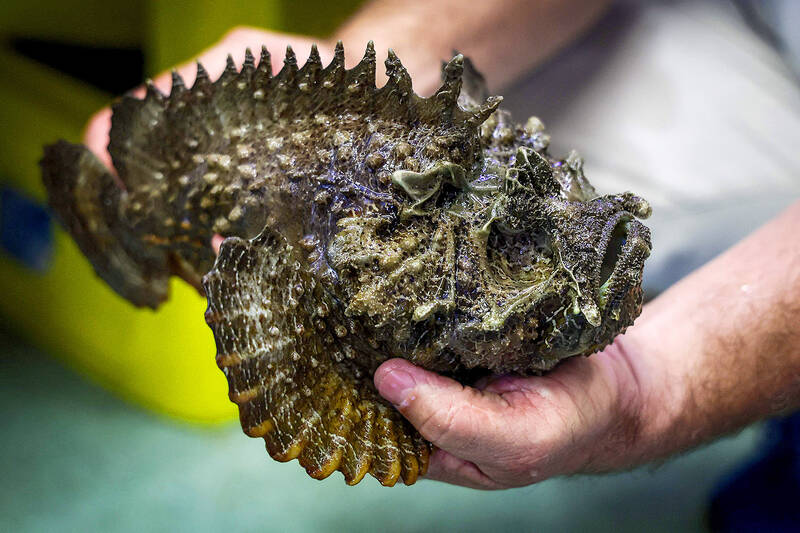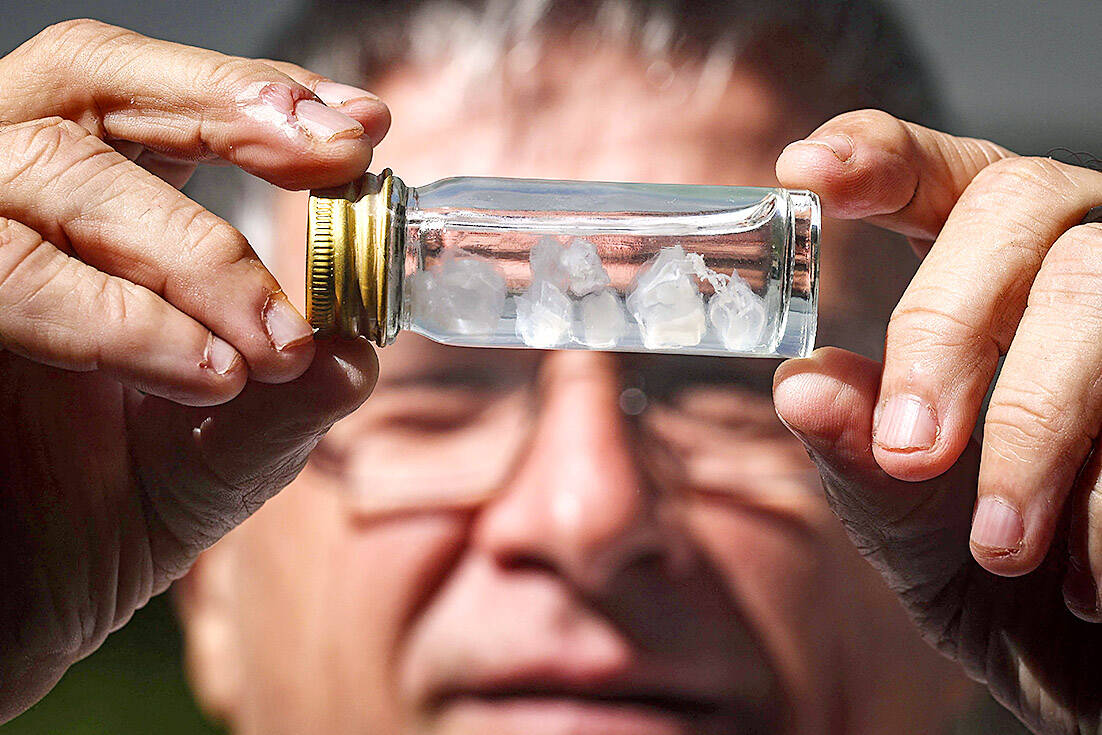Imagine feeling like an elephant is sitting on your chest, you can’t breathe, there’s a sense of impending doom and the pain is so intense you want to die.
You’ve just been stung by a tiny Irukandji jellyfish.
While you are unlikely to die, toxicologist Jamie Seymour of James Cook University in Australia says you’ll wish you had.

Photo: AFP
He should know — he’s been stung 11 times.
But Seymour’s job is riskier than most: milking sea creatures of their venom to create life-saving antivenoms.
Dozens of Irukandji jellyfish, some no bigger than a sesame seed, float in tanks inside a metal shed kept by the university in the state of Queensland.

Photo: AFP
In another tank, there are the most venomous fish in the world: the stonefish.
If its spines pierce your skin, the pain will cause you to lose consciousness and the area around the wound will turn black and die.
The stonefish’s venom is powerful enough to kill humans, but there have been no recorded fatalities in Australia. Seymour is also among those who have survived its sting.
His team is studying Australia’s deadliest marine animals in a bid to understand them and keep people safe.
“Australia is without a doubt the most venomous continent in the world,” Seymour said.
“When you talk to people, especially Americans, they’re surprised that we don’t all die at birth.” As Seymour moves around the tanks, he points out other deadly animals, including a box jellyfish which can kill a person within 10 minutes with its poison.
STINGS AND BITES
Despite the countless venomous animals across Australia, fatalities are relatively rare.
The latest official data show that between 2001 and 2017, there were an average of 32 animal-related deaths a year, with horses and cows the biggest killers.
Since 1883, there have been only two recorded deaths from Irukandji jellyfish and about 70 deaths from box jellyfish.
By comparison, there were about 4,700 deaths from drug, alcohol and vehicle-related incidents in Australia in 2022 alone, according to government data.
“So, the chances of you being stung by an animal in Australia — or bitten — is reasonable, but the chances of dying very small,” Seymour said.
His facility is the only one that milks venom from these deadly marine animals and turns it into antivenom.
For the deadly box jellyfish, that process is tricky. Researchers must remove their tentacles, freeze-dry them and collect the venom once it solidifies. There’s no antivenom for the Irukandji jellyfish.
Instead, doctors treat each symptom as it appears. If you get rapid medical advice, the chance of survival is high.
For the stonefish, the venom extraction process is more challenging. Researchers insert a syringe into a live fish’s venom glands, holding it with a towel while they withdraw a thimble full of the deadly fluid. They then send the venom to a facility in the state of Victoria which processes it into life-saving antivenom. First, the facility staff inject a small amount of venom over six months into an animal, such as a horse, which produces natural antibodies.
The animal’s plasma is later removed and the antibodies are extracted, purified and reduced into an antivenom for humans.
DEAD JELLIES
Antivenoms are shipped to hospitals around Australia and some Pacific islands, where they can be administered if someone is stung or bitten by an animal.
“We have some of the best antivenoms in the world, there is no doubt about that,” Seymour said, noting the time and effort put into producing the serums in Australia.
And antivenom may be increasingly needed, as climate change can raise the risk of a sting, according to scientists.
About 60 years ago, the Irukandji jellyfish stinging season in Australia was in November and December.
With ocean temperatures staying warmer for longer, now the jellyfish can linger as late as March.
Warming oceans are also pushing these deadly sea jellies — and other marine animals — further south along the Australian coast. Seymour’s students have found that temperature changes can also alter the toxicity of venom.
“For example, if I make an antivenom for an animal at 20 degrees and I get bitten by an animal that lives in the wild at 30 degrees, that antivenom isn’t going to work,” he said.
Studies have also shown that venom from stinging creatures could be used to treat myriad health conditions, including one in which rheumatoid arthritis was effectively cured in mice in two weeks.
But this area of research remains largely unfunded, and Seymour says his work continues. “When you think of the venom, think of it like a vegetable stew. There’s a whole heap of different components that are in there,” he said. “What we’ve been trying to do is pull these things apart and work out what’s going on.”

Cheng Ching-hsiang (鄭青祥) turned a small triangle of concrete jammed between two old shops into a cool little bar called 9dimension. In front of the shop, a steampunk-like structure was welded by himself to serve as a booth where he prepares cocktails. “Yancheng used to be just old people,” he says, “but now young people are coming and creating the New Yancheng.” Around the corner, Yu Hsiu-jao (饒毓琇), opened Tiny Cafe. True to its name, it is the size of a cupboard and serves cold-brewed coffee. “Small shops are so special and have personality,” she says, “people come to Yancheng to find such treasures.” She

In July of 1995, a group of local DJs began posting an event flyer around Taipei. It was cheaply photocopied and nearly all in English, with a hand-drawn map on the back and, on the front, a big red hand print alongside one prominent line of text, “Finally… THE PARTY.” The map led to a remote floodplain in Taipei County (now New Taipei City) just across the Tamsui River from Taipei. The organizers got permission from no one. They just drove up in a blue Taiwanese pickup truck, set up a generator, two speakers, two turntables and a mixer. They

Former Chinese Nationalist Party (KMT) chairwoman Hung Hsiu-chu’s (洪秀柱) attendance at the Chinese Communist Party’s (CPP) “Chinese People’s War of Resistance Against Japanese Aggression and the World Anti-Fascist War” parade in Beijing is infuriating, embarrassing and insulting to nearly everyone in Taiwan, and Taiwan’s friends and allies. She is also ripping off bandages and pouring salt into old wounds. In the process she managed to tie both the KMT and the Democratic Progressive Party (DPP) into uncomfortable knots. The KMT continues to honor their heroic fighters, who defended China against the invading Japanese Empire, which inflicted unimaginable horrors on the

Hannah Liao (廖宸萱) recalls the harassment she experienced on dating apps, an experience that left her frightened and disgusted. “I’ve tried some voice-based dating apps,” the 30-year-old says. “Right away, some guys would say things like, ‘Wanna talk dirty?’ or ‘Wanna suck my d**k?’” she says. Liao’s story is not unique. Ministry of Health and Welfare statistics show a more than 50 percent rise in sexual assault cases related to online encounters over the past five years. In 2023 alone, women comprised 7,698 of the 9,413 reported victims. Faced with a dating landscape that can feel more predatory than promising, many in